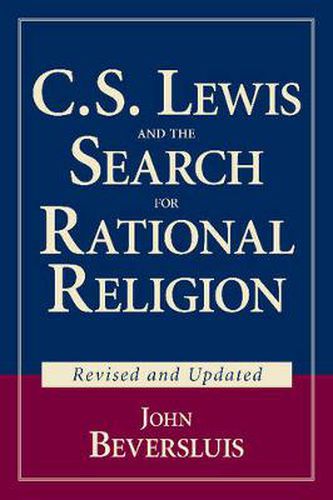Readings Newsletter
Become a Readings Member to make your shopping experience even easier.
Sign in or sign up for free!
You’re not far away from qualifying for FREE standard shipping within Australia
You’ve qualified for FREE standard shipping within Australia
The cart is loading…






C. S. Lewis was one of the most influential Christian apologists of the 20th century. An Oxford don and former atheist who converted to Christianity in 1931, he gained a wide following during the 1940s as the author of a number of popular apologetic books such as Mere Christianity , Miracles , and The Problem of Pain in which he argued for the truth of Christianity. Today his reputation is greater than ever - partly because of his books and partly because of the movie Shadowlands , starring Anthony Hopkins and Debra Winger. In advocating Christianity, Lewis did not appeal to blind faith, but to reason. Convinced that Christianity is rationally defensible, he boldly declared: ‘I am not asking anyone to accept Christianity if his best reasoning tells him that the weight of the evidence is against it’. But do Lewis’ arguments survive critical scrutiny? In this revised and expanded edition of his book originally published in 1985, philosopher John Beversluis takes Lewis at his word, sympathetically examines his ‘case for Christianity’, and concludes that it fails. Beversluis examines Lewis’ argument from desire - the ‘inconsolable longing’ that he interpreted as a pointer to a higher reality; his moral argument for the existence of a Power behind the moral law; his contention that reason cannot be adequately explained in naturalistic terms; and his solution to the Problem of Evil, which many philosophers regard as the decisive objection to belief in Christianity. In addition, Beversluis considers issues in the philosophy of religion that developed late in Lewis’ life - such as Antony Flew’s criticisms of Christian theology. He concludes with a discussion of Lewis’ crisis of faith after the death of his wife and answers the question: Did C. S. Lewis lose his faith? Finally, in this second edition, Beversluis replies to critics of the first edition. As the only critical study of C. S. Lewis’ apologetic writings, this readable and intellectually stimulating book should be on the bookshelves of anyone interested in the philosophy of religion.
$9.00 standard shipping within Australia
FREE standard shipping within Australia for orders over $100.00
Express & International shipping calculated at checkout
Stock availability can be subject to change without notice. We recommend calling the shop or contacting our online team to check availability of low stock items. Please see our Shopping Online page for more details.
C. S. Lewis was one of the most influential Christian apologists of the 20th century. An Oxford don and former atheist who converted to Christianity in 1931, he gained a wide following during the 1940s as the author of a number of popular apologetic books such as Mere Christianity , Miracles , and The Problem of Pain in which he argued for the truth of Christianity. Today his reputation is greater than ever - partly because of his books and partly because of the movie Shadowlands , starring Anthony Hopkins and Debra Winger. In advocating Christianity, Lewis did not appeal to blind faith, but to reason. Convinced that Christianity is rationally defensible, he boldly declared: ‘I am not asking anyone to accept Christianity if his best reasoning tells him that the weight of the evidence is against it’. But do Lewis’ arguments survive critical scrutiny? In this revised and expanded edition of his book originally published in 1985, philosopher John Beversluis takes Lewis at his word, sympathetically examines his ‘case for Christianity’, and concludes that it fails. Beversluis examines Lewis’ argument from desire - the ‘inconsolable longing’ that he interpreted as a pointer to a higher reality; his moral argument for the existence of a Power behind the moral law; his contention that reason cannot be adequately explained in naturalistic terms; and his solution to the Problem of Evil, which many philosophers regard as the decisive objection to belief in Christianity. In addition, Beversluis considers issues in the philosophy of religion that developed late in Lewis’ life - such as Antony Flew’s criticisms of Christian theology. He concludes with a discussion of Lewis’ crisis of faith after the death of his wife and answers the question: Did C. S. Lewis lose his faith? Finally, in this second edition, Beversluis replies to critics of the first edition. As the only critical study of C. S. Lewis’ apologetic writings, this readable and intellectually stimulating book should be on the bookshelves of anyone interested in the philosophy of religion.